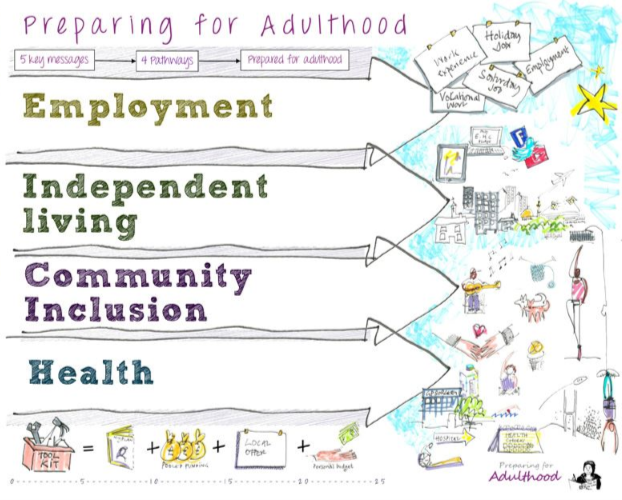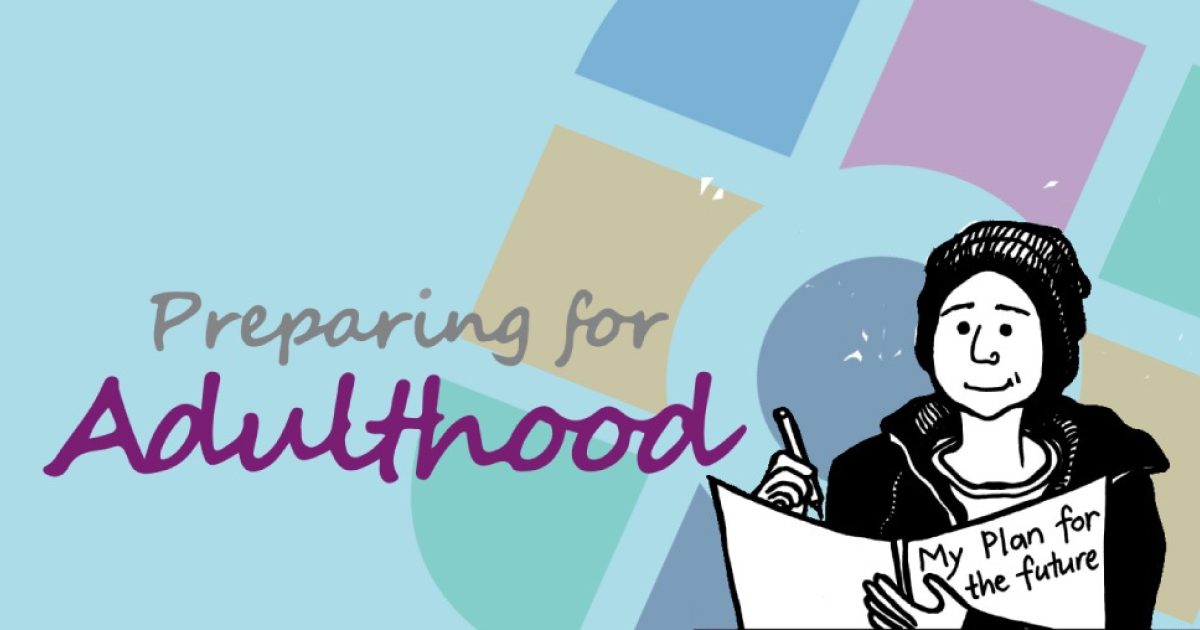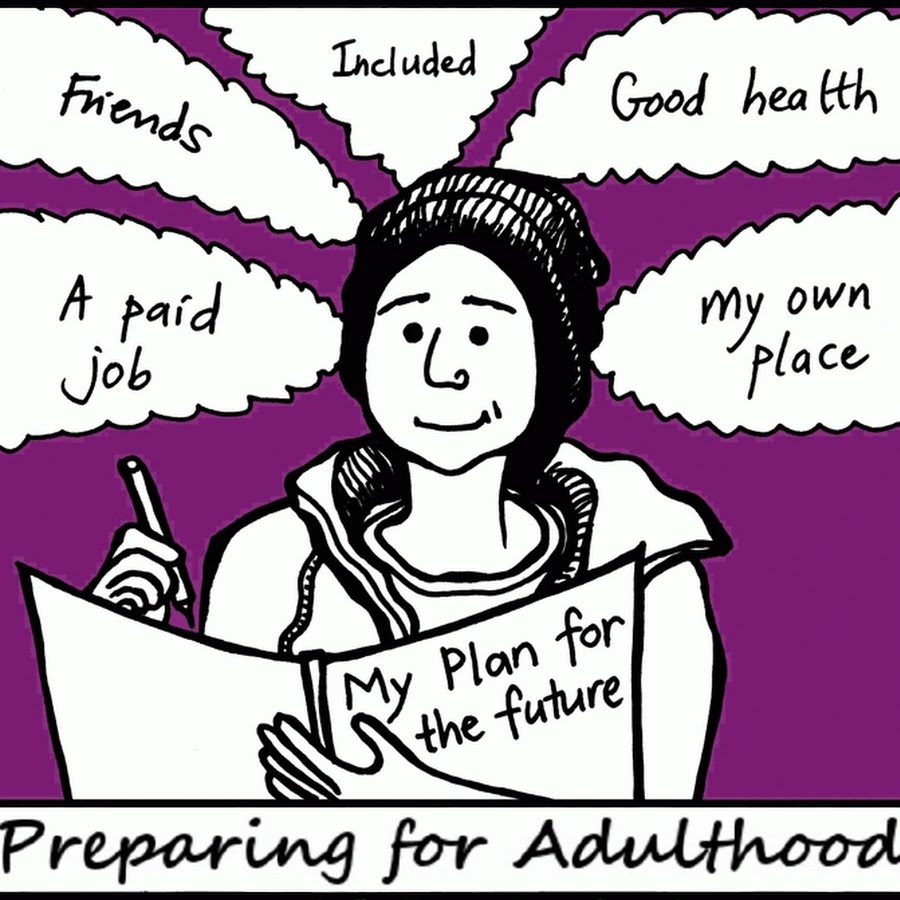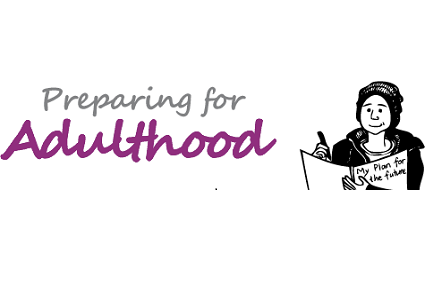

Post-16 Pathways
Our Foundations for the Future curriculum is divided into four pathways which are all based on identified, aspirational outcomes for adulthood.
The curriculum, across all four pathways, is based upon the four strands of the Preparing for Adulthood Curriculum:
- Employment,
- Independent Living,
- Friends, Relationships and Community inclusion
- Health

Pathway 1
Features of Pathway 1 Learners
| Communication & Interaction | The majority of learners will communicate through means other than verbal. |
| Sensory & Physical | Learners may exhibit some sensory needs that require interventions or reasonable adjustments. |
| Cognition & Learning | The students are developing as independent learners. |
| Social, Emotional & Mental Health | Learners may be developing their skills to stay safe within society, including being able to regulate their emotions and sensory load. |
| Independence | Some learners will need support with personal care, including medical. |
Provision Overview
Pathway 1 is designed for learners with significant and complex needs, who are functioning cognitively within the 0 to 84 month (0-7 year) range. These learners typically present with a broad range of learning difficulties that require a highly individualised and structured approach to support their development across all areas. Learners have a significantly limited attention span and may require frequent adult facilitation to engage in any activity. Understanding is often concrete and basic; learning is supported through repetition, consistency, and highly sensory approaches.
The curriculum is delivered in a highly adapted, personalised and pre-formal or semiformal environment that prioritises communication, engagement, and exploration of the real work in Preparing for Adulthood. High adult-to-learner ratios ensure that learners receive the intensive, individualised support they require. Staff teams are skilled in supporting emotional regulation, implementing sensory strategies, and delivering personalised learning targets. Multi-agency collaboration (therapists, medical teams, social care) is central to ensuring holistic and consistent provision.
Curriculum
Learners work cognitively between the developmental milestones of 0 to 84 months (0-7 years).
'Preparing for Adulthood' study, with a focus on independence.

Aspirational Aim
Empower each young person to achieve their highest level of independence, communication, and wellbeing in a safe, respectful and nurturing environment.
We strive to provide a personalised, meaningful curriculum that fosters engagement, promotes choice and autonomy, and prepares learners for the next stage of life through functional, life-skills-based experiences.
By focusing on communication, social interaction, physical development, and self-care, we support learners to express themselves, build relationships, and participate in their communities in ways that are purposeful and meaningful.
Through a multidisciplinary collaborative approach and strong partnerships with families and professionals, we strive to ensure every learner is seen, heard and valued, with opportunities to flourish regardless of the level or method of communication or ability.
Pathway 2
Features of Pathway 2 Learners
| Communication & Interaction | The majority of learners exhibit verbal communication skills. |
| Sensory & Physical | Learners may exhibit some sensory needs that require interventions or reasonable adjustments. |
| Cognition & Learning | The majority are developing as independent learners and applying understanding and skills of number and literacy functionality. |
| Social, Emotional & Mental Health | Learners may be developing their skills to stay safe within society, including being able to regulate their emotions and sensory load. |
| Independence | Learners are developing their safe behaviours around others and are working towards managing their own risk, transitions and health needs. |
Provision overview
Learners work cognitively between 8 and 11 years. The focus is on developing independence, functional life skills and preparing for adulthood in a supportive and structured environment. These learners typically have limited attention spans and may require prompts or adult support to stay engaged. They have developing social-communication skills and can usually communicate verbally, though their understanding and use of language may be below age-related expectations.
The curriculum is personalised and practical, promoting skills in communication, social interaction, functional numeracy and literacy, personal care, and community participation. Some learners may require support with aspects of personal care or daily routines.
Pathway 2 provision is designed to help each young person build confidence, develop meaningful relationships, and gain skills needed for greater independence and a positive transition into adult life.
Curriculum
Learners are working cognitively between the developmental milestones of 8–11 years.
'Preparing for Adulthood' through real-life experiences and opportunities, with a focus on independence

Aspirational Aim
To support learners to become confident, as independent as possible, and active participants in their communities.
We are committed to developing their functional communication, social interaction, and life skills through a personalised, practical, and meaningful curriculum.
Through structured support and real-life learning experiences, we aim to build their self-esteem, strengthen their decision-making skills, and encourage positive relationships with others.
While some learners may require continued support with personal care or daily routines, we focus on fostering independence wherever possible.
We strive to create an inclusive, respectful environment where every learner is empowered to express themselves, contribute, and prepare for a fulfilling adulthood on their own pathway.
Pathway 3
Features of Pathway 3 Learners
| Communication & Interaction | Learners predominately exhibit verbal communication skills. |
| Sensory & Physical | Learners may exhibit some sensory needs that require interventions or reasonable adjustments. |
| Cognition & Learning | Developing as independent learners. Working towards Functional skills qualifications in Maths, English and Digital Skills. |
| Social, Emotional & Mental Health | Being able to stay safe within society, including being able to regulate their emotions and sensory load. Beginning to travel with some independence. |
| Independence | Learning to keep themselves safe and working towards managing their own risk, transitions and health needs |
Provision overview
Learners work cognitively between 12 and 16 years. The curriculum is designed to build on prior learning and support students in developing the skills, confidence, and independence required for adulthood.
These learners are typically able to engage in more structured and formal learning environments and benefit from a curriculum that balances academic, vocational, and life skills. Learners at this level can hold meaningful conversations and engage in purposeful interactions with peers and adults. They are often confident communicators, though they may still require support when understanding more complex social situations or abstract concepts.
Students are generally independent in managing personal care and daily routines, allowing for greater focus on preparing for employment, independent living, further education, and active participation in the community. The provision includes opportunities for work-related learning, travel training, money management, and personal development.
The learning environment promotes independence, resilience, and self-advocacy, with tailored support to help each student achieve their individual aspirations and successfully transition into adult life.

Curriculum
Learners work cognitively between 12–16 years.
'Preparation for Adulthood' study with a focus on independence with real life opportunities in the world of work.
A broad and rich functional curriculum that builds on knowledge, understanding and transferable skills.
Aspirational Aim
To equip learners working at a cognitive level of 12–16 years with the skills, confidence, and independence they need to thrive in adult life. We strive to provide a structured and supportive learning environment where students can engage in purposeful, meaningful learning that reflects their individual strengths, interests, and aspirations.
Through a broad and balanced curriculum that includes academic, vocational, and life skills learning, we aim to foster resilience, independence, and self-advocacy. Learners are encouraged to take increasing responsibility for their choices, develop positive relationships, and prepare for further education, employment, or supported apprenticeships. We are committed to ensuring every learner is empowered to reach their full potential, contribute to their community, and move into adulthood with confidence, and a clear sense of purpose.
Pathway 4
Features of Pathway 4 Learners
| Communication & Interaction | Learners typically exhibit verbal communication skills. |
| Sensory & Physical | Learners may exhibit some sensory needs that require interventions or reasonable adjustments. |
| Cognition & Learning | Developing as independent learners and working towards Functional Skills qualifications in Maths, English and Digital Skills. |
| Social, Emotional & Mental Health | Being able to stay safe within society, including being able to regulate their emotions and sensory load. |
| Independence | Keeping themselves by managing their own risk, transitions and health needs. Travel Independently. |
Provision overview
Learners are working cognitively between 16–18 years. The provision focusses on preparing students for a successful and confident transition into adulthood. These learners have established attention and cognitive skills, enabling them to engage in a formal learning environment with increasing independence. Students at this level are typically able to manage their personal care independently and work towards greater autonomy in other areas of life, including decision-making, time management, and self-advocacy.
The curriculum is tailored to support functional academic learning, vocational training, and personal development, with a strong emphasis on employability, independent living, and community participation. Learners are supported through real-world learning experiences such as work placements, enterprise projects, and travel training. Opportunities are provided for developing communication, teamwork, problem-solving, and digital skills, all of which are essential for adult life.
This stage of provision is designed to build confidence, expand choices, and equip students with the tools they need to make informed decisions about their futures, whether moving into employment, supported living, further education, or training.

Curriculum
Learners are working cognitively between 16–18 years.
'Preparation for Adulthood' study focusses on independence and accessing real-life work experience and opportunities in the world of work.
Accessing a broad and rich functional curriculum that builds on knowledge, understanding and transferable skills.
Aspirational Aim
Our aspiration is to empower learners working at a cognitive level of 16–18 years to take confident, informed steps into adulthood with independence, purpose, and self-belief. We aim to nurture their strengths and equip them with the practical, social, and emotional skills needed to thrive beyond education.
Through a personalised, real-world curriculum focused on employability, independent living, and community engagement, we encourage learners to explore their interests, take ownership of their decisions, and become active, contributing members of society. We are committed to fostering resilience, responsibility, and ambition—ensuring every learner leaves with the confidence and capability to shape a fulfilling and meaningful adult life.

